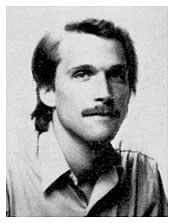First Person | WBT in the '50s
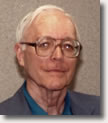 By Bailey Hobgood
By Bailey Hobgood
I was program director of WBT from 1955-1960. I came to WBT in 1954 to be assistant p.d. to Bill Melson, who, shortly after I arrived accepted a promotion to Personnel Manager. I then moved up to Bill's position as p.d. Here are some of my main memories from my 5 years in that job (chalk up my mistakes to memory taken by time).
Wade St. Clair and Doug Ben were assistant program directors during my time as p.d. Clarence Etters and Fuzz Prevatte (now Walker) were music librarians. Ned Burgess was promotion manager. Paul Marion and Buddy Evans served as sales managers. Bob Covington was station manager.I made an auspicious start as program director—WBT lost money for the first time in my first month as p.d.
The announcing staff was a talented and versatile group. For example, hurricane coverage in the '50s meant sending announcers to key locations at the coast. On their own they had to collect information and find a telephone to call reports to the station. Jack Knell and J.B. Clark of the news staff anchored coverage out of our studios. In helping to coordinate coverage I was in a position to appreciate the announcers' ability to describe the storm and its damage. Today I have even greater respect for the sound-only they had to use to furnish live coverage of hurricanes and other disasters, parades, even the Miss N.C. Pageant (with help from Pat Lee) and other major events.
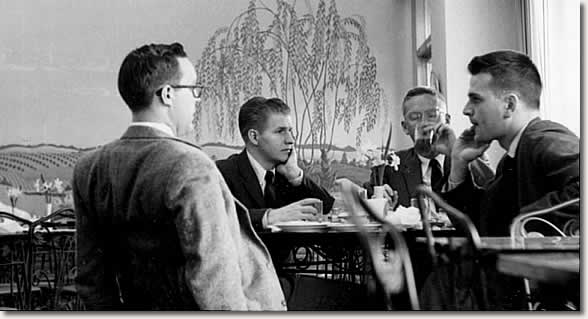 |
Lunch in the Pine Terrace—From left: Bailey Hobgood,
Doug Bell,
C
lyde McLean, Wade St. Clair |
Because of our tight money situation (rock and roll radio and tv were becoming so popular that ad money for our traditional radio was hard to come by), we were limited in what we could do locally on WBT. To encourage the announcers to create their own shows to help the station put on quality shows and, at the same time, give the announcers the potential for additional talent fees, we devised a plan where announcers received a modest fee for putting a show on the air and a small "commission" for any spots sold in the show. With the blessing of the plan by the union, announcers helped us put on a variety of fresh shows —Fletcher Austin on the movies, Bob Bean on travel, Bill Ward and Phil Agresta on "Pigskin Party" and other sports shows, Gil Stamper reading poetry and other material, Doug Mayes hosting a country music program and shows on other topics.
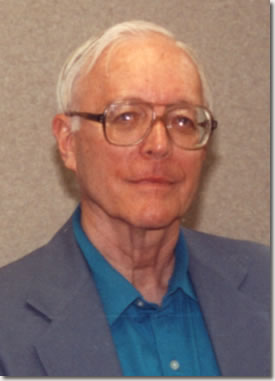 |
| Bailey Hobgood today |
Announcers worked both radio and tv, which frequently meant they were involved in both at the same time. This conflict was usually resolved by taping their radio programs to be played while they were involved in tv planning and production. This was an enormous burden for the engineers, recording radio shows, announcements and other material. In the midst of all this long, complex taping who can forget Tommy Stutts, with that mischievous smile on his face, asking: "Wuz you wanting to record that?"
Alan Newcomb couldn't keep his creative juices from flowing even when he was just covering a "fill" program of music. On Saturday afternoon in such a situation Alan invented SPEMOSA (Society for Playing Music on a Saturday Afternoon). He treated the time as a meeting of SPEMOSA and conducted the meeting for the entire time period. He was also assigned the high traffic weekday 5-6 pm period which he name "The Hitchhiker," talking with the listener as if a rider and playing music along the way.
We created the Project 60 series to run weeknights 8-9 mainly because management was so involved in tv that we were left to do about anything we wanted to try as long as it didn't cost much money. On Project 60 we featured a range of programming you couldn't find anywhere else on radio—concerts by the Greensboro Symphony Orchestra recorded in Ovens Auditorium (where I met my future wife Eve), spoken word records, celebrity interviews (Doug Mayes did a memorable one with Harry Golden), recorded music of all types, stage plays on record and by local drama groups and a variety of special events. Clyde McLean hosted most of the programs and Doug made many contributions. One program I helped produce with Doug, on the beginning of rock and roll and how the music might affect youngsters, won a prestigious Ohio State Award. If rock and roll was the only "vice" we had to worry about today!
It was Mr. Crutchfiel's idea to produce a series interpreting the news as broadcast on Radio Moscow. Alan Newcomb interviewed a local Russian expert about program content on Radio Moscow. It was aired during a time of tense relations with Soviet Russia so there was a lot of interest in the program.
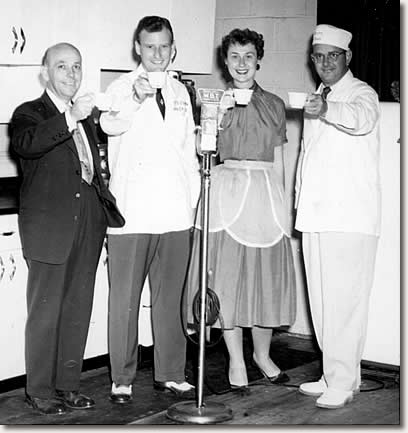 |
| Broadcasting from a sponsor's showroom—From left:
Clarence Etters, Bob Bean, Jeanne Alexander, Jim Patterson |
"Studio Party" was a long-running live audience participation program originating for many years from a local music store and then from the WBT studios. Jeanne Alexander, Bob Bean, Fletcher Austin and Jim Patterson emceed the show at various times. It featured interviews, games, cooking and other homemaker information, and special features. Clarence Etters played the organ at the music store and Loonis McGlohon and his trio, with vocalist Bob Williams, took over music duties the last years of the show.
Charles Kuralt was an announcer for at least one summer during my time at WBT. The world lost a great late night deejay when we lost him to a grander career. I remember his lamenting one night: "Well, I can never make it in tv because I'm too small to be a wrestler and too large to be a puppet," reflecting the popular programs and characters of early tv.
Sunday nights at 10 Dr. Lawrence Stell, minister at a local Presbyterian church, took questions on the air and offered answers and advice on a variety of topics.
Bob Raiford on his late night jazz program taught me most of what I know and appreciate about jazz today. With his knowledge of jazz and music in general, he entertained and taught at the same time.
J.B. Clark interviewed visiting celebrities and local people of special interest on "Profile," which ran weekday afternoons at 5:55, right before the news. One of his guests was Christine Jorgenson, the U.S. soldier who had a sex change operation in Denmark. She was on tour giving dramatic readings on stage. J.B. asked me to come with him to interview her in her hotel room on a Sunday afternoon, and, of course, I didn't miss the opportunity. Christine asked us to be her guests that evening at a local night club where she would perform. J.B., his wife, my date Eve and I sat at her table. It was an interesting evening. Several hecklers kept shouting for her to "take it off" until she finally closed her book and walked off the stage, ending her act. She was most gracious and beyond that you would have had to ask our ladies.
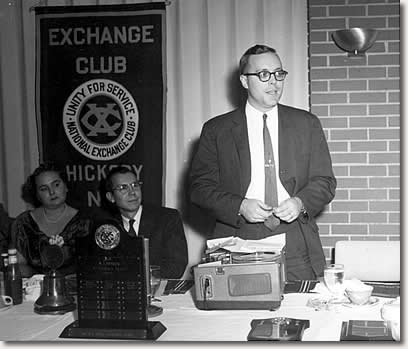 |
Bailey Hobgood talking up radio (and
WBT, of course) to a Hickory civic club. |
At the end of a long, sleepless weekend working on hurricane coverage I had to be a judge at a hula hoop contest for youngsters sponsored by a local bicycle dealer. The contestant who was the last one standing was to receive a bicycle. Unfortunately contestants continued to twirl their hoops for hours on a hot summer afternoon until finally contestants and judges could last no longer. The bicycle dealer ended up giving a new bicycle to about 12 contestants who were standing at the end.
In the declining years of CBS radio entertainment shows, Robert Q. Lewis and Rusty Draper starred in their own prime time shows. Robert Q. Lewis and Rusty Draper? However, we did have "Gunsmoke" (with William Conrad), Arthur Godfrey and some exceptional CBS News documentaries.
In a Ken Tredwell-inspired move, Bob Rierson and I helped bring the Harvesters Quartet and Loonis McGlohon to WBT and WBTV. The Harvesters were given a regular show on radio which launched their successful career which lasts even today (with different performers). Loonis played on "Studio Party" and was put in charge of the music library. One of his main duties was to select music for the Grady Cole Show, a daunting assignment.
Election night coverage was held in a WBT studio, where all Charlotte stations set up for broadcast, One year in the Wilder Building all precinct captains were supposed to report their results to us. All except one reported early but the evening wore on without hearing from him. We finally called his house and his wife said he had left several hours earlier to take the baby sitter home, with the ballots and tallies in his car. We finally got our report but I wonder what he got at home.
Bailey is retired and lives in Greensboro, NC.
